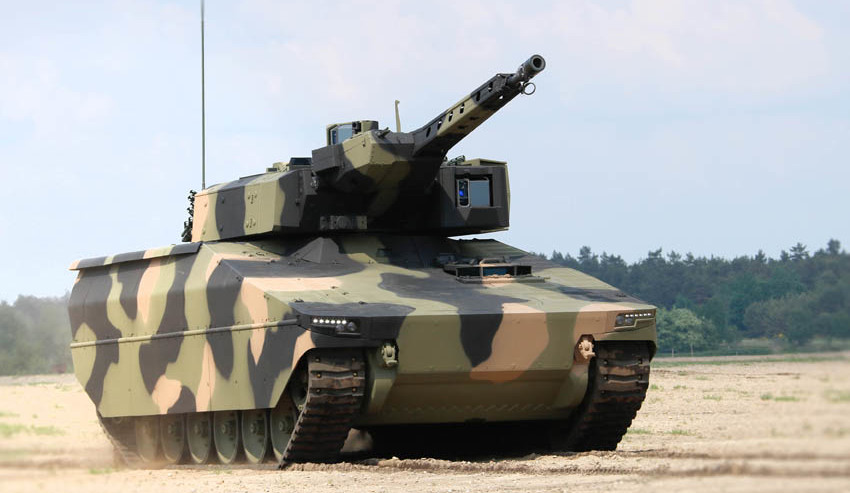Raytheon and Rheinmetall Defence have joined forces to present the Lynx Infantry Fighting Vehicle (IFV) to the US Army's Next-Generation Combat Vehicle-Optionally Manned Fighting Vehicle (NGCV-OMFV) Program, which will see a replacement for the M2 Bradley IFV first introduced in 1981.
Scheduled for fielding in 2026, the NGCV will be optimised for urban combat and rural terrain. The Army has named the NGCV as a top modernisation priority supported under the service's new Futures Command structure.
Rheinmetall unveiled the latest version of the Lynx Infantry Fighting Vehicle earlier this year. The new, tracked, armoured vehicle is designed to address the critical challenges of the future battlefield, with a focus on growth capacity and lower life cycle costs
Ben Hudson, global head of Rheinmetall's vehicle systems division, said, "Rheinmetall and Raytheon have worked together successfully for many years on numerous programs. We are once again combining the best of German and American engineering to provide the US Army with a step change in capability, giving soldiers the overmatch advantage they expect and deserve. Production of the Lynx in the US will enable additional development and sustainment of the world-class American defence industrial base."
Raytheon technology earmarked for the Lynx could include advanced variants of Raytheon weapons, next-generation thermal sights, the Coyote unmanned aircraft system and the company's Active Protection System. Like those systems, the vehicle will be made in America.
Dr Taylor Lawrence, Raytheon Missile Systems president, said, "We fully understand the Army's need to quickly modernise its ageing family of combat vehicles. Our team offers a fresh, innovative approach, not business as usual. Raytheon will equip the new Lynx with the world's most advanced technology to deliver a modern fighting vehicle that will keep US soldiers far ahead of battlefield threats for decades to come."
The Lynx KF-41 is also a central competitor in Australia's $10-15 billion LAND 400 Phase 3 program to recapitalise Army's M113 Armoured Personnel Carrier (APC) force, with an IFV and APC.
The Lynx, described as highly survivable, adaptable to diverse environments, extremely agile, hard hitting, and with huge payload reserves, is a next-generation combat vehicle designed to confront the challenges of the future battlefield like no other.
Gary Stewart, Rheinmetall Defence Australia managing director, said, "Rheinmetall has developed this vehicle so it is positioned at an ideal level of maturity when Australia needs it to enter service in 2026 – and it will have a growth path to extend these capabilities through its 40-year life."
The Lynx KF-41 has been designed to meet the following operational needs from inception:
- Combined arms capabilities at the platoon level so that commanders can adapt while in contact;
- Combined arms fighting systems to conduct operations across the spectrum of conflict;
- High mobility to enable tactical flexibility in contact;
- Adaptable vehicle systems that can be upgraded or modified in theatre; and
- Survivability that forces the enemy to operate above the detection threshold.
This has resulted in a vehicle with:
- High levels of inherent capability;
- Modularity to tailor protection and achieve rapid upgrades;
- Open electrical, electronic, software and mechanical architectures; and
- Growth in payload and electrical power.
The Lynx KF41 will include the capability to support a crew of 12 (three crew, up to nine troops), have a max road speed of 70km/h, a road range of more than 500 kilometres, with an armament consisting of the Lance 2.0 30-35mm autocannon, a 7.62mm coaxial machine gun and a variety of additional close in weapons systems.
LAND 400 Phase 3 will acquire and support the next generation of Armoured Fighting Vehicles (AFV) with the firepower, protection and mobility to defeat increasingly adaptive adversaries well into the future.
The US Army NGCV Cross Functional Team (CFT) was established as part of the Army's modernisation strategy. The team consists of hand-selected military and civilian personnel, who are charged with narrowing or closing cross-domain maneuver capability gaps. The current NGCV CFT portfolio encompasses the Armoured Multi-Purpose Vehicle, or AMPV; Mobile Protected Firepower, or MPF; Optionally Manned Fighting Vehicle, or OMFV; future robotic combat vehicles, or RCV; and the next-generation main battle tank.
Headquartered in Düsseldorf, the publicly traded Rheinmetall AG is a high-tech enterprise dedicated to the twin modern imperatives of mobility and security. Founded in 1889, the group today consists of two operational components: Rheinmetall Defence and Rheinmetall Automotive.
One of the world's leading suppliers of military systems and equipment, Rheinmetall's Defence arm comprises three divisions: vehicle systems, electronic solutions, and weapon and ammunition. The group's 23,000-strong global workforce generated sales last year of $6.9 billion.
Raytheon, with 2017 sales of $25 billion and 64,000 employees, is a technology and innovation leader specialising in defence, civil government and cyber security solutions. With a history of innovation spanning 96 years, Raytheon provides state-of-the-art electronics, mission systems integration, C5I products and services, sensing, effects, and mission support for customers in more than 80 countries. Raytheon is headquartered in Waltham, Massachusetts.









